Empathy towards employees can improve mental health in the workplace | Brillian S. K. | Chief People Officer | TimesPro

Three years of living with a global pandemic have altered the way we live and work. Individual priorities have changed and so have their concerns and needs. These changes reflect even in the functioning of organisations. With teams working from home the challenges multiplied and organisations had to bring structural changes to adjust to the new way of working.
Changes in the chain of command, power hierarchy, policies for hiring, and everything related to work have changed. This also drove the focus on the physical and psychological well-being of people. Providing support and ensuring the positive mental well-being of teams through best-fit practices is now the norm.
TimesPro recently undertook a survey to understand more about the state of mental health in the workplace which led to the release of the TimesPro Workplace Mental Health India 2022 Report. One of the key findings was that 96% of respondents believed mental health to be an important component of their life.
The productivity of an individual is linked to their mental well-being, and its disruption is a matter of deep concern for an organisation. A disturbed psyche affects the individual’s cognitive functions leading to absent-mindedness, impairing decision-making abilities, and physiological impacts including fatigue, headaches, increased heartbeats, or palpitations. It is pertinent to note that a person’s mental health can be affected despite not suffering from psychological illnesses like depression, generalized anxiety disorder or bipolar disorder, etc. Therefore, the absence of diagnosed mental ailments does not suggest that a person’s mental health is in a good state. Hence a structured and directed intervention to help identify such elements becomes critical from
a well-being perspective.
Mental health is complex, and triggers can occur due to problems at work or challenges individuals face in their personal lives. They can experience difficult working conditions, overwhelming workloads, job insecurity, and unhealthy interpersonal relationships at the workplace. Fortunately, there are ways for HR leaders and practitioners to support staff to cope with mental health.
Inclusive & Empathetic Office Culture
The culture reflects the values and beliefs, and a healthy culture is an integral part to promote positive mental health at work. Some elements to build a strong and supportive culture includes:
1. Building empathy and a strong relationship built on trust, respect, and kindness between teams and managers. Individuals should feel comfortable approaching their managers to discuss professional and personal challenges. Clear communication amongst teams is important. TimesPro Workplace Mental Health India 2022 Report reinforces this with more than 67% of respondents indicating that empathy is the key to being a good manager.
2. Diversity in the workplace, and openness to diverse opinions and ideas help amplify an inclusive culture. It’s important that everyone feels supported and their voices have given due recognition.
3. Safe and healthy working conditions can create an environment where individuals are not scared of opening up and discussing ideas, and viewpoints that may be diverse.
Adequate Health & Safety Policies
Teams should be appraised of mental wellness benefits by organizations to feel assured during a health emergency. Any concerns raised regarding the working conditions should be treated with utmost seriousness. It is essential to treat each case as unique and one size fits all approach to be done away with.
Access To Mental Health Resources
Wellness initiatives that are accessible and confidential should be available. Counselling, and medical support services should be a part of these initiatives. Though these seem low-ticket items for many, they are powerful and help build a stronger employer connection.
When we accept that productivity and mental wellness go hand in hand, we can be free of the stigma that comes with discussing mental health-related issues and approach it like any other problem that requires a solution to help both the individual and organization perform better. It is no longer a one-time checklist activity to gain brownie points, this is the new world. We all need to embrace, accept, and support each other as we collectively build a positive workplace.


